|
Edited. 2013 November
Dr. Chomora Mikeka - Alumni of Japanese government scholarship, now a lecturer at the University of Malawi-
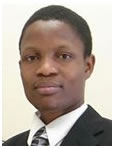 |
Dr. Chomora Mikeka
Dr. Mikeka studied in Japan from 2006 to 2012 for 6 years on the Japanese governemt scholarship. He has gained MSc and PhD in Electrical Engineering from Yokohama National University. His research in Japan focused on cellular and DTV RF energy harvesting and applications. He is currently a senior lecturer in Physics and Electronics at Chancellor College in the University of Malawi and also the director for the Malawi White Spaces Project in Partnership with the Malawi Communications Regulatory Authority (MACRA) and the International Center for Theoretical Physics (ICTP) in Trieste, Italy.
Dr. Mikeka was awarded the title of Best ICT Researcher in Malawi on December 11th 2013. |
-How did you learn about the scholarship or training opportunity in Japan? What made you decide to apply?
I was told about it by Prof. Takeshi Utsumi. Prof. Utsumi searched for local talents in developing countries who could assist him with the establishment of the Global University System (GUS). In Malawi, he found me via internet documents. I informed him of my childhood desire to interact with Japanese people, and the interest to study in Japan. Coincidentally, or opportunistically, the University of Malawi’s Central Office in Zomba received Monbusho application forms from the Japanese Embassy in Lusaka, and the Pro-Vice Chancellor then, Prof Leonard Kamwanja decided that I apply. The application documents were handled by the Embassy in Lusaka and the Ministry in Tokyo, but with logistical support from the University of Malawi and JICA, and I was awarded the Scholarship in 2005. Then, it was very rare to find a Malawian studying in Japan, let alone on Monbusho Scholarship.
-What were your ideas about Japan before travelling to Japan?
I encountered Japan through radios that our family used in Malawi. As a child I was simply fascinated with the enchantment of radio technology. Through trial and error of learning the mechanism of radio by playing with the broken radio at my uncle’s home, I ended up making a radio by myself in 1991; this was while I was in Junior High School. Since then, I prayed to find an opportunity to come to Japan and explore more in the world of radio engineering. I was fascinated with each electronic gadget that had a signature, “Made in Japan.” This even included the Casio and Seiko alarm wrist watches, which I got from my uncle as presents for getting best scores at School.
-What were your initial thoughts after arriving in Japan if you can recall?
My thoughts were of great success. I think I was excited to have landed in Japan; more like a dream coming true; I never really cared what puzzles I would meet. Of course, I was shocked to find the people a bit quieter than I thought. As such, the first year, I interacted more with my fellow foreign students. However, later, I saw the need to master the Japanese language and culture and interact with the Japanese more. In the end, I am happy to realize that I have most of my international friends being Japanese; and I miss them already.
-Please describe your stay in Japan, where did you live, what did you study?
For the six years in Japan, I lived in Kanagawa prefecture (Kanagawa-ken), Yokohama City (Yokohama-shi), Minami Ward (Minami-ku) in Gumyouji and Maita apartments. During this time, I studied for Master and Doctoral Degrees in the Division of Physics, Electrical and Computer Engineering with Prof. Hiroyuki Arai as my supervisor.
-What challenges did you face during your stay in Japan?
Just one challenge in my early years of stay in Japan; it was the language. The Japan I dreamed of and the Japan I encountered were like two different sides of a coin without the Japanese language skills. I found myself unable to pursue my academic passion and explore the world of Japanese technology fully because of the language barrier. I came to realize that learning Japanese language was essential for me to appreciate the experience in Japan. Utilizing the tutor system as well as the compulsory language training, gradually I became able to communicate in Japanese. At first I was not sure if my lab mates liked me but when I started talking to them in my ‘boro boro Japanese’ (broken Japanese), I discovered their interest was aroused. Suddenly, like an avalanche breakdown, I became friends with my lab mates and other Japanese folks outside the university.
-What are the most memorable events during your stay in Japan? Please describe.
The visits I made to various places for academic conference presentations (kaigi) and the home party invitations (parti), including home stays. These events and occasions made me learn and enjoy the warmth and culture of the Japanese.
-After spending some time in Japan, what do you like about Japan the most?
The Japanese values I cherish are the honesty and the dedication to duty.
The Japanese are honest in the affirmative and sensitive ways. They will say yes when the answer is yes but, when the answer is no, the Japanese in general hesitate. I think it is for their kind nature of not wanting to hurt the feelings of the other person. This I found is similar with Malawians. For a Malawian, when the answer is no, they may tell you: nkhaniyi ndaimva, ndiyeno, ndikuyimbirani kuti tilankhulane bwino bwino( 'I have heard your story/issue; I will make an effort to call you so we can talk about it nicely') when in fact they will never call you. Being Malawian, it was easy for me to appreciate the Japanese culture of indirectness in this regard.
Also, the Japanese will try to do their duty as perfectly and as fast as possible. Generally in my culture, if you want something done, you have to be very patient to wait or risk having an imperfect job, if you hurry. We have a proverb, kukana nsalu ya akulu nkuviika ('circumstances may justify a lie'). But now I find myself working like Japanese, fully applying the value of efficiency in my work ethics.
Finally, I believe that what Japan outshines Malawi, and perhaps the whole world, is their perseverance. Japanese do not give up so easily. The stoicism they display especially in their times of hardship or when they work towards an uncertain goal is unbelievable.
-What was the major difference you found between Japan and Malawi?
One of the major differences I found between Japan and Malawi was that the Japanese never seem to compete against each other. They work as a team toward achieving a common goal. They are not aggressive towards each other in their approaches. In this regard, I had to moderate myself during class or research as I was more used to the idea of aggressive competition which I had been taught In Malawi, through the education system coming from Britain. Of course, one needs to take into consideration that the resources are limited in Malawi as compared to Japan, so you have to compete to gain the scarce opportunity available.
However, the balancing factor is that Malawians are good at sharing. Those who have gladly share with those who do not have.
-In what ways are the experience and knowledge you gained during your stay in Japan benefitting you now?
In Japan, I learnt to evaluate the efficiency of doing any activity; this is helping me to focus on the core duties in my research and academic life and conduct my work with highest possible level of efficiency. Of course, not for my personal benefit but for the benefit of Malawi and even beyond. This is another aspect, I learnt from the Japanese i.e. to work diligently for the nation they were born in (love for motherland).
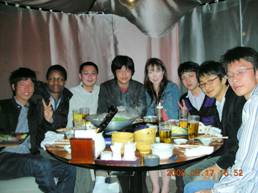
With my labmates (Arai Labo) in Hakata, Kita-Kyushu. Goodtimes!
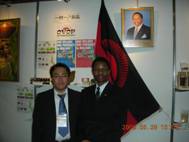
During TiCADIV (2008): Yokohama
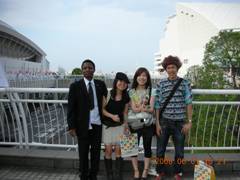
With my friends in Japan
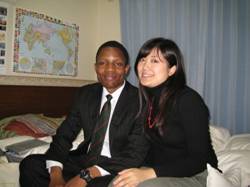
With my best friend in Japan
| Copyright (C): 2012 The Embassy of Japan in Malawi |
|



